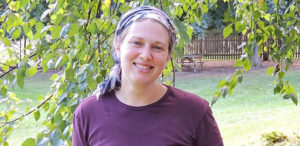
Years as a teacher: 18
Years at LGA: 8
Why did you become a teacher?
I have always loved working with kids, and the idea of learning with kids in a more structured environment was an opportunity I could not pass up.
What drew you to teach at LGA?
I came to LGA as a long-term Hebrew sub for 1st and 3rd grades. Working in Rana’s classroom, I saw kids excited to learn and having fun doing so, and a teacher who was committed to meet each child’s needs.
Going around to other classes, I saw the same commitment to reaching each student. This was something I had never seen before! The conversations I had with teachers and staff, the support I received as a substitute, both from my mentor and from other teachers, felt so good and honest.
I still see that; teachers respect and help each other. I love coming to work in a place where respect is palpable; where students take care of each other and their environments; where the social-emotional curriculum is as important as the multiplication tables and vocabulary; and where learning how to dive into sacred textual studies can inform deeper readings in English texts.
I also love that, as a staff, we strive to constantly better ourselves, be it through professional development, mentoring and collaboration, or just rethinking our approaches.
Teachers at LGA are not stagnant beings! We work hard to be the best we can be, because that is what our students deserve.
What is your favorite subject to teach?
I love teaching Torah in Kindergarten/Gan because of what my students bring with them to our discussions. There are days when I think, “The rabbis had nothing on my Gan kids!” in the perspectives and possibilities my students bring to their interpretations of the Biblical stories we explore.
In 3rd Grade/Kitah Gimel, I love the prayer-writing unit. Using the question, “How can we make prayer more meaningful” as a springboard, we explore different types of prayers, and examples of traditional and modern prayers and blessings.
Then students work together to determine what they need to know, and what the class should explore, in order for each student to be able to write their own prayers. I love the collaboration, constructive critique and investment students bring to our unit, and I love when the class shared their prayers and reflections on writing with other classes.
What is a favorite activity that you do with students outside of the main curriculum?
I love our “Omer Buddies” on the farm! As a way to mark time, we track the weeks between Passover and Shavuout by counting the Omer. We tell the stories of farmers, both modern and ancient, who also tracked these weeks, but for different reasons.
“Omer Buddies” is the perfect blending of the two! We track changes to our landscape with each student choosing a “buddy,” a living thing (plant, tree, flower, etc.) to observe over the next 7 weeks.
With care, students observe and record changes in their “buddy,” sharing with classmates. I love the solo sits, observations, and communal sharing.
How is LGA different than other schools?
Where else can students act and sing in a play, designing the costumes and set, learn textual analysis skills from deep readings into sacred texts, eat communal lunches with buddies from each classroom, have art in every aspect, and still have teachers meeting the educational and social needs of their students?
LGA offers our older students mentoring opportunities with the youngest children in the school, providing the opportunity to learn and bond across grade levels. Where else will you see fourth graders and kindergarteners playing together at recess?
What benefits do you see from our dual general studies and Judaic curriculum?
There are many times when secular and Judaic curriculum intersect, offering students multiple approaches to the same idea. How often does one get to learn about prefixes and suffixes in English, only to revisit the same idea in Hebrew?
Our students are able to bring with them an understanding of how to delve deep into a text, reading beyond the surface meaning, and reaching more thoughtful, and at times, esoteric, levels of understanding. Studying sacred texts offers students opportunities to read for meaning, and deeper meanings.
What is your favorite aspect to our communal celebrations, both holiday and lifecycle events?
I love our communal celebrations, how we join together to sing, celebrate and mourn, to mark the passage of time and the cycle of holidays and the year.
For me, food is an important part of shared memory. Offering students an opportunity to tap into our traditions by making traditional foods for the entire community gives them an entree into both the shared memory and community building.
Similarly, sharing lifecycle events gives our students a place in community, be it cheering on a classmate who is getting ready to celebrate a milestone birthday or Bar/Bat Mitzvah, welcoming a new family (or new family member) into our community, or offering support as we celebrate the life of a lost loved one.
These celebrations bond us together, and I love that we offer a context and framework that can be a starting point for our families, as they explore their own Jewish journeys, where ever the trip may lead.

Copyright © 2025 Lander-Grinspoon Academy. All rights reserved. Website designed by Addicott Web.